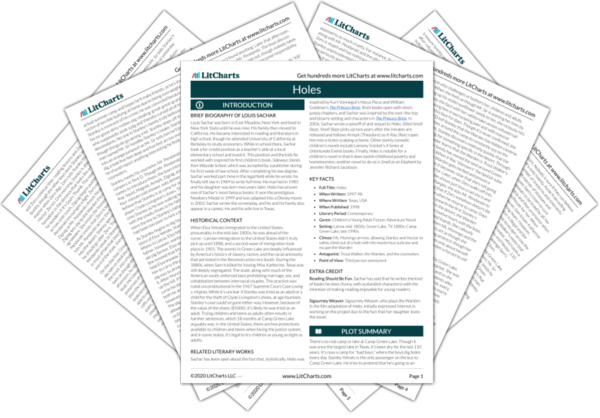Fate and Destiny
Holes follows fourteen-year-old Stanley Yelnats, a boy wrongly accused of stealing a pair of shoes, as he's sent to Camp Green Lake in the Texas desert to serve his sentence. For generations, Stanley's family has been haunted by the specter of Stanley's "no-good-dirty-rotten-pig-stealing-great-great-grandfather." That great-great grandfather, Elya Yelnats, didn't follow through on a bargain he struck with a "gypsy" woman, Madame Zeroni, and the Yelnats family has been plagued by bad luck…
read analysis of Fate and DestinyCruelty vs. Kindness
Camp Green Lake is an impossibly cruel place. There, the Warden forces teenage inmates to dig holes five feet wide and five feet deep, seemingly for no reason other than to "build character." In addition to this backbreaking labor, the adults in charge, who are ironically referred to as counselors, also work hard to terrify the inmates and destroy their senses of self-worth—and in turn, they foster an environment in which cruelty and terror are…
read analysis of Cruelty vs. KindnessJustice
Holes explores the complexity of justice, both in terms of formal justice systems like courts of law, and more personal justice systems, such as the banditry and vigilante justice of the outlaw Kissin' Kate Barlow in the late 1800s. By exploring the ways in which the formal justice system falls short and doesn't actually promote justice, both in the present and in the past, Holes questions the usefulness of formal systems of justice in the…
read analysis of Justice
Power, Money, and Education
At its heart, Holes is a study of power dynamics. By considering the different ways that characters gain power, hold onto it, or are unable to do either, Holes questions the very nature of power and, specifically, the different ways that individuals are denied power due to poverty and a lack of education.
One of the first means of gaining power that the novel explores is through money. The Yelnats family is extremely poor, while…
read analysis of Power, Money, and EducationMan vs. Nature
In all three settings of the novel (Latvia in the mid-1800s; Green Lake, Texas in the 1880s; and Camp Green Lake in the late 1990s), the natural world is afforded a great deal of power over its human inhabitants. For those who are willing to play by the natural world's rules, nature isn't something to be feared; rather, it's something that can bring happiness, good fortune, and even economic prosperity. For those who seek to…
read analysis of Man vs. Nature






